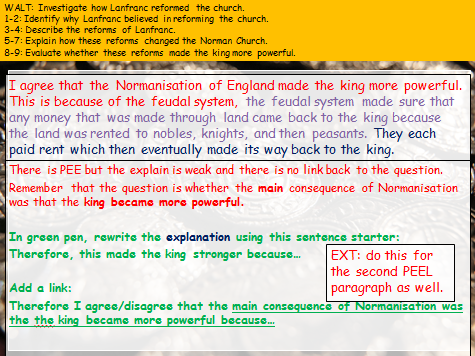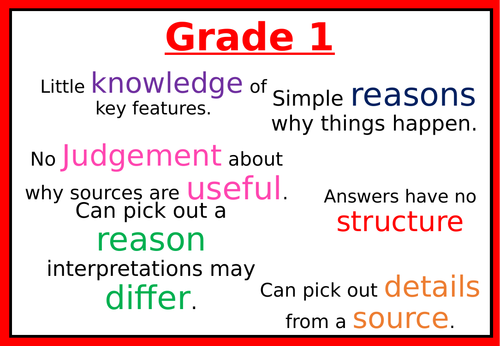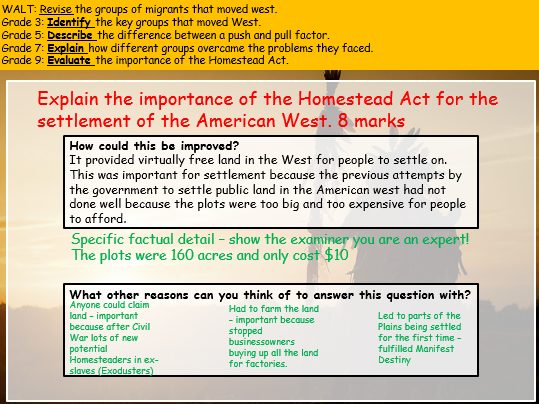
177Uploads
75k+Views
23k+Downloads
All resources

Lanfranc's reforms with exam skills (Edexcel history 9-1)
Pupils explore Lanfranc’s reforms before analysing an exam response to the 16 mark question on the Norman’s paper.
Pupils mark the answer using a simplified mark scheme before improving a paragraph and then writing their own about Lanfranc and whether his reforms made the king more powerful. Encourages pupils to familiarise themselves with PEEL paragraphs and focus on applying these skills and using words from the question to ensure their explanation is analytical enough for a level 3-4 answer.

Grade Descriptors Edexcel History Display
Display created to inform pupils what is required for the new specification. goes from 1-9, I used the specification grade boundaries to create this display, the wording for g8-9 was identical which is why this grade boundary has one page rather than two.

Who moved West? Revision session American West Edexcel 9-1
Revision lesson designed to last one hour. Homework included that analyses the Oklahoma Land Rush and gives pupils a choice of three exam questions - narrative, consequence or importance.
Pupils:
define push and pull factors and explain why people moved west
analyse a timeline of key features of the migration west
describe the Mormon migration, Exoduster movement and Donner Party
Analyse the importance and the consequences of the Homestead Act

Weimar Germany The 'New' Woman
Fully differentiated lesson about the New Woman in Nazi Germany
Students will:
WALT: evaluate how far women’s lives improved in the 1920s.
Identify visual changes to women by 1925.
Describe how areas of women’s lives changed.
Explain how society reacted to these improvements for women.
Evaluate how far you agree with a statement.
Students complete the screenshotted task before analysing a how far do you agree statement using a ‘agree’o’meter’.
Students are also given the opportunity to look at source work and analyse whether the changes were positive or negative for women.

Votes for Women! Suffragists and Suffragette’s interpretation lesson
stand alone lesson to celebrate the centenary of votes for women and to provide pupils with an overview of the subject.
Pupils describe the two groups (suffragists and suffragettes) and will gain an understanding of the words militant and moderate. Pupils will also be able to explain why women were not allowed the vote and eventually gained the vote following WW1.
Skills building section develops pupils ability to analyse interpretations.

Wounded Knee and Ghost Dance (American West (Edexcel history 9-1))
Whole lesson covers the ghost dance and the massacre at wounded knee.
Lesson fully differentiated with the opportunity for discussion as to why the Ghost dance would terrify white settlers and how they reacted to the massacre.

Anglo-Saxon Local Govenment (Anglo-Saxon and Norman England (Edexcel 9-1))
WALT: Examine the government of Saxon England at a local level.
2-3: Identify and define key words.
4-5: Describe the role of the Shire Reeve.
6-7: Explain how the legal system works in Anglo Saxon England.
8-9*: Evaluate the impact of collective responsibility.

Medicine Through Time key words (Edexcel 9-1)
Three page document of key words for the Medicine through time unit and the historic environment (Medicine on the Western Front).
I used the pearson textbook and went through cover to cover to produce a document of all key words to support pupils with the content prior to examination.

Norman Invasion: Housecarls V. Knights
Full lesson - taught to y7 and y10 fits Edexcel specification (Anglo-Saxon and Norman England 1060-1088).
Worksheets as a hidden slide within the powerpoint. Very successful when taught to year 10 pupils.
Polish differentiation included.

Introduction to WW1 - distribution of power in 1914
Pupils evaluate the power of each country by analysing whether they have an army, money, empire and any other relevant information.
They then argue why they think their country is the most powerful and get into a ‘living line’ from most to least powerful. They must then defend their decision.
Leads into a lesson regarding long and short term causes of WW1 including the assassination of FF.

Submission of the Earls 1066 - Normans (Edexcel history 9-1)
Whole lesson, fully differentiated with worksheets.
The final task asks pupils to compare answers against success criteria to mark and then improve two weak 16 mark answers,

Why Enlist - Propaganda in WW1
Lesson that introduces pupils to the concept of propaganda, pupils complete a carousel in which they analyse posters and how they would make them feel. They evaluate how likely they would have been to join the army and then analyse how useful a fictional soldiers account of why he joined the army is (preparation for GCSE edexcel how useful question).

REVISION Keeping Control (Edexcel 9-1: Anglo-Saxon and Norman England)
Session designed to revise the key theme of Norman Control after the Battle of Hastings. As with all of my revision lessons this is fully resourced and fully worksheet based so that exercise books/lined paper are not required.
WALT: Revise and explain how William kept control of Norman England.
WILF 1: Identify methods William used to keep control of England.
WILF 2: Describe five methods of control and Explain at least three in detail.
WILF 3: evaluate why William was able to keep control of England and apply knowledge to a 12 mark Q
Starter: identify 5 methods of control using the image (Exam 4 mark question as challenge)
Task one: create the feudal system and compare it to the saxon heirachy. (answers of similarities and differences on slide)
task two :video task (5 minutes)
task three: using the information sheet and own knowledge complete the mind map (see cover photo)
task four: 12 mark control exam question - can be set as homework.

Pointless - Medicine Through Time
Designed to cover all units of medicine through time as a last lesson of term activity.

Fort Laramie Treaty 1851 (American West (Edexcel history 9-1))
Significance and importance of the Fort Laramie Treaty of 1851
Includes ‘explain the importance of’ homework.

Reservations (American West (Edexcel history 9-1))
Lesson explores concepts of reservations, assimilation and the Dawes Act of 1887.

REVISION Treaty of Versailles and Weimar (Edexcel 9-1 Weimar and Nazi Germany)
Part of a series of revision lessons in which pupils prepare for their final examination for Paper Three Weimar and Nazi Germany as part of the 2016 Edexcel specification.
Pupils will:
WALT: Revise the Treaty of Versailles and problems with the Weimar government.
Grade 3: Identify the terms of the Treaty of Versailles and describe how the Germans felt about it.
Grade 5: Describe the strengths and weaknesses of the Weimar constitution.
Grade 7: Explain why the government was unpopular and who opposed it.
Grade 9: Evaluate whether Hyperinflation was positive or negative for the people of Germany.

Who was Henry VIII?
Introductory lesson for Henry the Eighth. Pupils compare reasons Henry is remembered as a good and a bad king to come to a conclusion as to how they think he should be remembered.
Pupils also answer an interpretation question - training for the new GCSE reforms.
WALT: Explore the type of king Henry VIII is remembered as.
Level 3: Identify what makes a good king.
Level 4: Describe the type of person Henry VIII was.
Level 5: explain how features of Henry’s personality made him a good king.
Level 6: assess the main difference between two interpretations.

Henry VIII: Great Matter and Break with Rome
Lesson that analyses the reasons for the Break with Rome and the impact this had on England, pupils explore the topic through video and a spot the difference task in which they consider the difference between a catholic and protestant church.
Pupils are asked to consider why Henry himself did not become a Protestant.
WALT: Explore how the Great Matter led to the establishment of the Protestant church.
Level 3: Identify key words that we will use today.
Level 4: Describe the Great Matter and the Break with Rome.
Level 5: explain the difference between Catholic and Protestant churches.
Level 6: Assess why Henry chose not to be christened as a Protestant.

American West Key Words
two age document with key words for the unit on it - in line with Edexcel 9-1.
I went through the Pearson textbook and included all of the key words from front to back of the textbook.




















